Sciatica Treatment Market Size Projections and Insights, 2031
The global sciatica treatment market size was valued at $678 million in 2021, and is projected to reach $991.3 million by 2031, growing at a CAGR of 3.9% from 2022 to 2031. By type, the chronic sciatica segment was the highest contributor to the market in 2021. By drug class, non-steroidal anti-inflammatory drug (NSAIDs) segment dominated the market in 2021 and is anticipated to grow at the highest CAGR during the forecast period. By distribution channel, the retail and specialty pharmacies segment dominated the market in 2021. However, the online providers segment is anticipated to grow at the highest CAGR during the forecast period. Region wise, North America generated the largest revenue in 2021. However, Asia-Pacific is anticipated to grow at the highest CAGR during the forecast period.
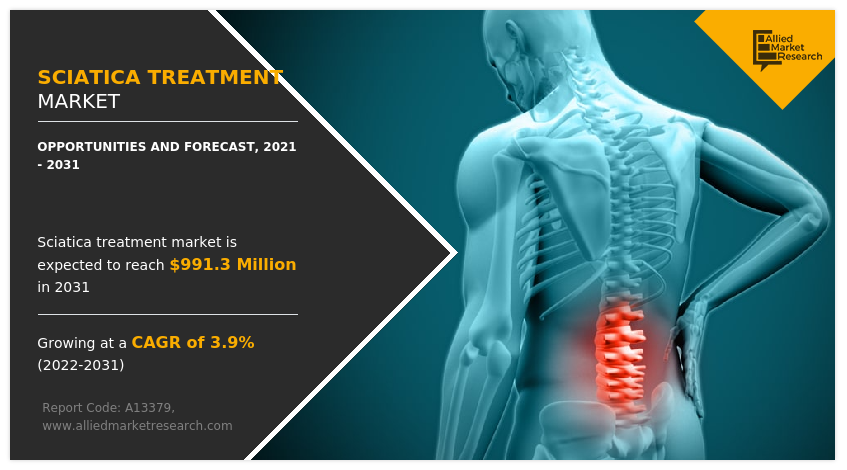
Sciatica Treatment Market Overview & Growth Drivers
Sciatica is referred to the pain that mainly affects sciatic nerves whereas sciatic nerves are the nerves that travel from the lower back through the hips and buttocks and down through each leg. Sciatica may be acute, chronic, or other type. Drugs mainly non-steroidal anti-inflammatory drug (NSAIDs), steroids, antidepressants, and others are used for the treatment which is distributed mainly through hospital pharmacies, retail and specialty pharmacies & online providers.
Increase in incidences of sciatica is the major factor that drives the growth of the sciatica treatment market. There has been a tremendous rise in incidence of various conditions such as herniated disc, spinal stenosis, spondylolisthesis, trauma, and others. Moreover, sciatica can also be caused by the nerves being compressed by osteoarthritis and fractures due to osteoporosis. These conditions prove to be the cause for increase in incidences of sciatica.
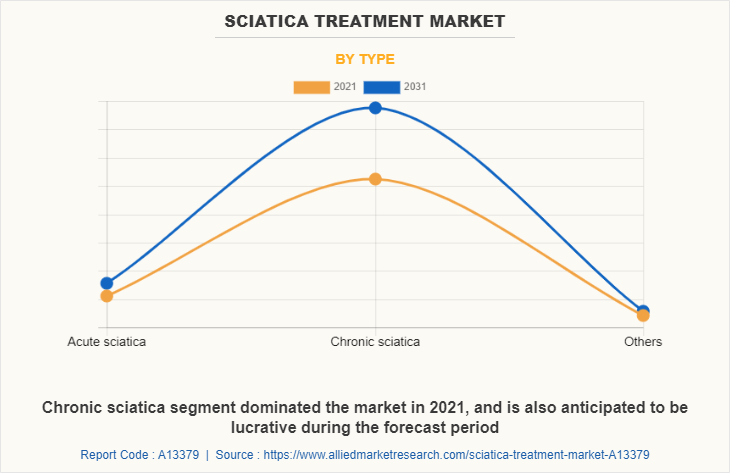
Furthermore, increase in geriatric population is the key factor driving the growth of the sciatica treatment market share. Globally, geriatric population has witnessed a substantial growth over past few years, and is anticipated to grow at a significant rate in the future. This rise in geriatric population indicates the increase in age-related conditions which also includes the increase in incidences of sciatica. Thus, there is an increase in demand for sciatica treatment medications to treat such age-related conditions, which propels the growth of the sciatica treatment market. Emerging economies of Asia-Pacific and LAMEA present lucrative opportunities for market players. Surge in healthcare, industrial development, and investments from developed countries in Asia-Pacific, along with rise in awareness regarding new treatment approaches for various sciatica is anticipated to positively impact the market during the forecast period.
Industry Highlights
- The increasing prevalence of sedentary lifestyles and prolonged sitting in modern work environments is contributing to the rising number of sciatica cases, boosting demand for both preventive and therapeutic treatments.
- Pharmacies, clinics, and hospitals serve as key distribution channels, providing widespread access to sciatica treatment.
- There is a heightened public awareness of flu prevention, particularly in light of global pandemic preparedness efforts.
- North America remains the leading regional market for sciatica treatment due to its advanced healthcare infrastructure and high consumer demand.
Sciatica treatments have long been valued for their ability to provide effective pain relief and improve mobility, making them a preferred choice for both patients and healthcare providers. Certain treatment options, particularly those offering non-invasive or minimally invasive methods, are highly valuable in the market due to their ability to alleviate symptoms without surgical intervention. Pharmacological treatments, including NSAIDs, corticosteroids, and nerve pain medications, remain in high demand because of their convenience and effectiveness in managing acute and chronic sciatica pain. Many patients associate these treatments with improved quality of life, fostering trust and loyalty toward personalized treatment plans tailored to their specific needs.
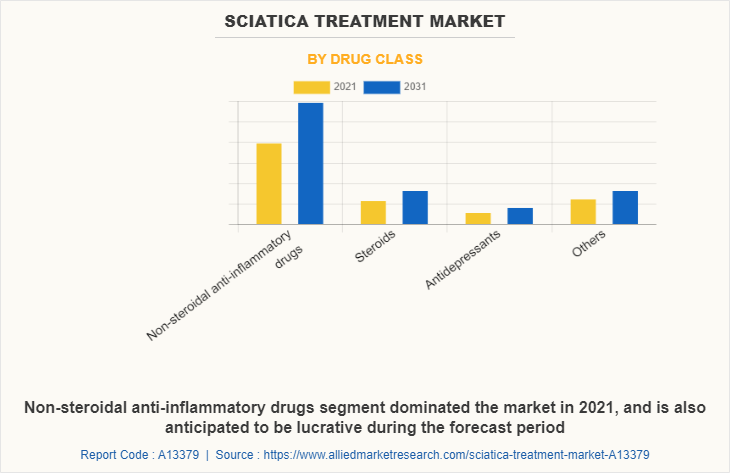
Key Areas Covered in the Report
- Sciatica treatments are highly sought-after due to their ability to provide effective pain relief and improve mobility, particularly for individuals suffering from chronic or severe pain conditions.
- The market faces competition from alternative therapies, such as chiropractic care, acupuncture, and herbal supplements, which are gaining popularity as non-invasive options for managing sciatica pain.
- Patient preferences are evolving, with a growing demand for non-surgical and holistic treatments that provide long-term pain relief without significant side effects, contributing to the sustained growth of pharmacological therapies.
- Challenges in the value chain include the high cost of advanced therapies and unequal access to specialized treatments, particularly in developing regions, limiting the overall accessibility of cutting-edge options for sciatica relief.
A variety of therapy modalities, such as non-invasive therapies, conventional pharmaceutical treatments, and newly developed regenerative medicine, compete in the sciatica treatment market growth. Due to their accessibility and track record of success, traditional therapies including NSAIDs, physical therapy, and steroid injections continue to be widely used. The market is becoming more diversified as a result of improvements in pain management and growing public awareness of non-surgical treatments; patients now have more options for personalized treatment. In addition, increase in R&D activities in pharmaceutical field is driving the growth of the market. Major players are focusing on developing new drugs and APIs having application in sciatica treatment that are potent and efficient. Moreover, there is an increase in outsourcing research activities by the pharmaceutical companies to academic and private contract research organizations (CROs), which allows the company to stay competitive and flexible in a world of increasingly advanced technologies.
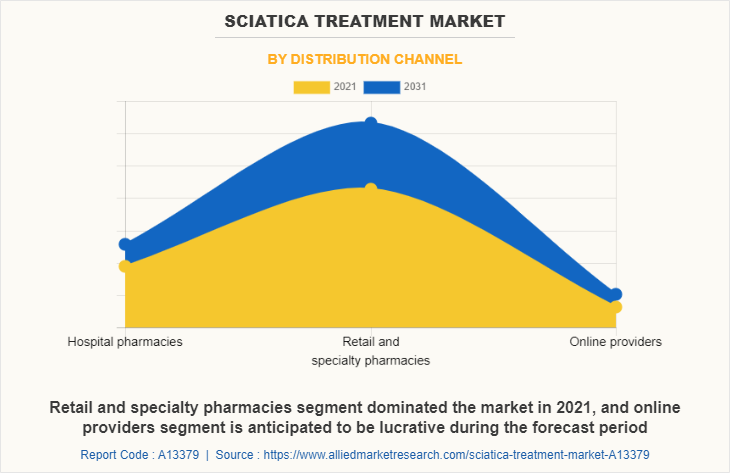
Topics discussed in the report
- Impact of sedentary lifestyles on sciatica prevalence
- Emerging markets for sciatica treatment
- Patient preference for non-invasive treatments
- Access to advanced treatments in developing regions
- Chronic pain management solutions
Sciatica Treatment Market Segment Overview
The sciatica treatment market is segmented by type, treatment, distribution channel and region. By type, the market is categorized into acute sciatica, chronic sciatica and others. On the basis of drug class, the market is segregated into non-steroidal anti-inflammatory drug (NSAIDs), steroids, antidepressants, and others. On the basis of distribution channel, the market is categorized into hospital pharmacies, retail and specialty pharmacies and online providers. Region wise, the market is analyzed across North America (the U.S., Canada, and Mexico), Europe (Germany, France, the UK, Italy, Spain, and rest of Europe), Asia-Pacific (Japan, China, Australia, India, South Korea, and rest of Asia-Pacific), and LAMEA (Brazil, South Africa, Saudi Arabia, and rest of LAMEA).
The chronic sciatica dominates the type segment as it is prevalent in aging population and is long term. The non-steroidal anti-inflammatory drug (NSAIDs) segment dominated the market and is expected to grow at the fastest rate during the forecast period, owing to the increase in adoption and prescription of NSAIDs by many healthcare professionals for sciatica pain management around the globe. The retail and specialty pharmacies segment exhibited highest growth in 2021, owing to increase in number of retail and specialty pharmacies around the globe, and due to easy availability of OTC medications in the drug store. Asia-Pacific is expected to witness highest growth during the forecast period, owing to factors such as rise in investments in manufacturing of high-quality products by major key players, and availability of raw materials for manufacturing of sciatica treatment medications.
Comparative Matrix of Key Segments
Parameters | Acute Sciatica | Chronic Sciatica | NSAIDs | Steroids |
Market Share | Widely prevalent | Increasing due to aging population | First-line treatment for pain | Used for severe inflammation |
Duration | Short-term, typically lasting weeks | Long-term, may last months or years | Short-term use for mild to moderate pain | Typically used for short-term relief |
Distribution Channels | Hospitals, Retail Pharmacies | Pain clinics, rehabilitation centers | Pharmacies, over-the-counter | Hospitals, clinics, specialist centers |
Challenges | Risk of recurrence, need for quick relief | Difficulty in managing long-term pain | Limited in addressing inflammation | Potential side effects with prolonged use |
Regional Dynamics and Competition
North America is expected to occupy a dominant share in the global sciatica treatment market share during the forecast period, owing to its well-developed healthcare infrastructure, rise in awareness among people about sciatica and government support for quality healthcare. Asia-Pacific is expected to register the highest CAGR. Rise in geriatric population, increase in sciatica disease incidence, investments by major key players, and initiatives by healthcare government, are the major factors driving the growth of the market in Asia-Pacific region. The major market players from the developed regions have shifted their focus on emerging countries such as China and India, owing to high adoption rate of sciatica treatment in these countries. Moreover, increase in prevalence of various conditions such as osteoarthritis, lumbar spinal stenosis, and spondylolisthesis, are anticipated to fuel the growth of the sciatica treatment industry in Asia-Pacific.
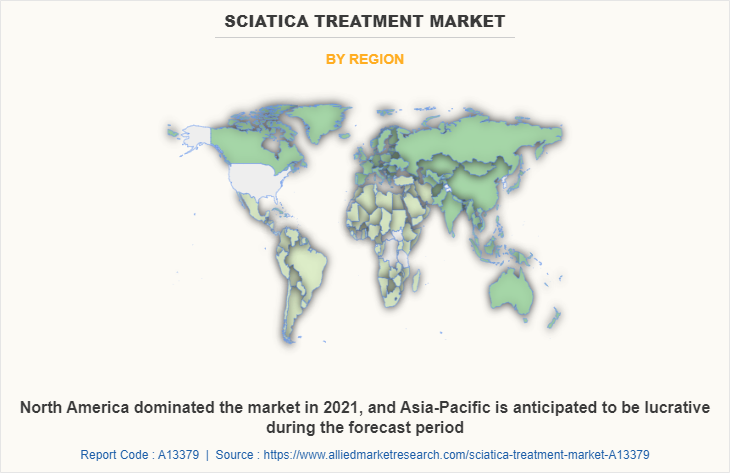
Major key players that operate in the Abbott, Alkem Laboratories Limited, Amneal Pharmaceuticals LLC., Aurobindo Pharma, Johnson & Johnson, Sinfonia Biotherapeutics, Sorrento Therapeutics, Inc, Sun Pharmaceutical Industries Ltd., Teva Pharmaceutical Industries Limited and Zydus Group.
Sciatica Treatment Market News Release
- In November 2022, Sinfonia announced that the U.S. Food and Drug Administration (FDA) has approved Sinfonia's Investigational New Drug (IND) application for phase IIb studies in chronic sciatic pain with its lead compound SB0101.
- In October 2022, Sinfonia announced that its lead compound SB0101 shows excellent product characteristics for treatment of chronic sciatica as an injectable biologic that has demonstrated impressive pain lowering activities in clinical studies.
- In March 2021, Abbott announced the launch of its new Brufen Power spray, a unique double-strength formulation of proven pain-relieving active ingredient diclofenac, delivered with a unique one-shot spray.
- In August 2021, Alkem Laboratories Ltd. announced the launch of Ibuprofen and Famotidine Tablets in the U.S., following an approval from the U.S. Food and Drug Administration (US FDA)
- The popularity of online distribution channel is growing owing to its high convenience and discounts.
Key Benefits For Stakeholders
- This report provides a quantitative analysis of the market segments, current trends, estimations, and dynamics of the sciatica treatment market analysis from 2021 to 2031 to identify the prevailing sciatica treatment market opportunities.
- The market research is offered along with information related to key drivers, restraints, and opportunities.
- Porter's five forces analysis highlights the potency of buyers and suppliers to enable stakeholders make profit-oriented business decisions and strengthen their supplier-buyer network.
- In-depth analysis of the sciatica treatment industry segmentation assists to determine the prevailing market opportunities.
- Major countries in each region are mapped according to their revenue contribution to the global market.
- Market player positioning facilitates benchmarking and provides a clear understanding of the present position of the market players.
- The report includes the analysis of the regional as well as global sciatica treatment market trends, key players, market segments, application areas, and market growth strategies.
Sciatica Treatment Market Report Highlights
| Aspects | Details |
| Market Size By 2031 | USD 991.3 million |
| Growth Rate | CAGR of 3.9% |
| Forecast period | 2021 - 2031 |
| Report Pages | 241 |
| By Type |
|
| By Drug class |
|
| By Distribution channel |
|
| By Region |
|
| Key Market Players | Aurobindo Pharma, Johnson and Johnson, Sorrento Therapeutics, Inc, Abbott Laboratories, Zydus Lifesciences Limited, Sinfonia Biotherapeutics, Alkem Laboratories Ltd, Amneal Pharmaceuticals LLC, Sun Pharmaceutical Industries Ltd., Teva Pharmaceutical Industries Limited |
Analyst Review
This section provides various opinions of top-level CXOs in the global sciatica treatment market. According to the insights of CXOs, the increase in demand for efficient and high-quality medications for the treatment of sciatica is expected to offer profitable opportunities for the expansion of the sciatica treatment market. Also, increase in adoption of NSAIDs as medication for treatment of sciatica by healthcare providers is boosting the growth of the market. Moreover, technological advancements in manufacturing and development of formulations have increased the production capacity as well as the efficacy and quality of the medication, which is driving the growth of the market.
CXOs further added that increase in incidence of sciatica in the population of developed as well as developing regions has largely contributed toward the market revenue in 2021, and is expected to maintain this trend throughout the forecast period. Also, increase in awareness around the globe regarding sciatica disease and its treatment options, significantly contributes towards the revenue generation. In addition, increase in prevalence of conditions such as herniated disc, bone spurs, or rarely the tumor increase the incidence of sciatica, which contributes to the growth of the sciatica treatment market.
Furthermore, North America is expected to witness highest growth, in terms of revenue, owing to increase in awareness among the people regarding management of various disease conditions and rise in government initiatives for offering effective patient care, lead to the growth of the market. However, Asia-Pacific is anticipated to witness notable growth, owing to increase in investments for manufacturing of pharmaceutical products in the emerging economies such as India and China
Major factors that drive the growth of the sciatica treatment market include increase in incidence of sciatica, surge in R&D activities for developing novel therapeutics for sciatica and rise in awareness among the people regarding sciatica and its treatments.
Chronic sciatica is the leading type in the sciatica treatment market.
North America is the largest regional market for sciatica treatment.
Abbott, Alkem Laboratories Limited, Amneal Pharmaceuticals LLC., Aurobindo Pharma, Johnson & Johnson, Sinfonia Biotherapeutics, Sorrento Therapeutics, Inc, Sun Pharmaceutical Industries Ltd., Teva Pharmaceutical Industries Limited and Zydus Group., are the top companies to hold the market share in sciatica treatment.
The sciatica treatment market valued for $678.02 million in 2021 and is estimated to reach $991.26 million by 2031, exhibiting a CAGR of 3.9% from 2022 to 2031.
2021 is the base year of sciatica treatment market.
2022-2031 is the forecast year of sciatica treatment market.
Loading Table Of Content...



